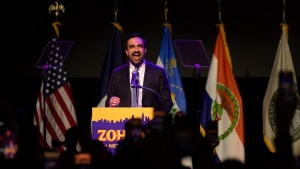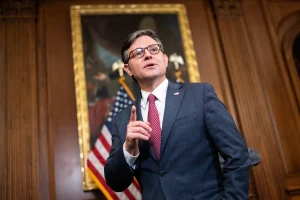Zohran Mamdani’s victory in the New York City mayoral race has sent shockwaves across the nation. At just 34 years old, Mamdani has become the youngest person elected as New York City’s mayor in over a century. Beyond his youth, his election is historic for multiple reasons: he is the first Muslim and first South Asian candidate to secure the city’s top political post, breaking longstanding barriers in one of the most prominent urban centers in the United States.
Mamdani, a Democrat with democratic socialist leanings, won the election on Tuesday, November 4, with 50.4 percent of the vote. His closest rival, former Governor Andrew Cuomo, secured 41.6 percent, while right-wing activist Curtis Sliwa trailed far behind with 7.1 percent. Analysts have described Mamdani’s triumph as a landmark moment, reflecting not only a generational shift in leadership but also a broader embrace of progressive policies among New Yorkers.
While supporters celebrated his win as a transformative moment for the city, not everyone was pleased. President Donald Trump, who had openly criticized Mamdani’s candidacy, reacted to the election results with a brief but pointed four-word message on his social media platform, Truth Social: “…AND SO IT BEGINS!”
Trump’s disdain for Mamdani was clear even before the election. In interviews and public statements leading up to the vote, he urged New Yorkers to back Andrew Cuomo instead, calling Mamdani incapable of managing the city. Speaking on “60 Minutes,” Trump remarked, “Whether you personally like Andrew Cuomo or not, you really have no choice. You must vote for him, and hope he does a fantastic job. He is capable of it, Mamdani is not!”
In addition to political criticism, Trump hinted at the possibility of withholding federal funds from New York City if Mamdani were to win. On Truth Social, he wrote: “If Communist Candidate Zohran Mamdani wins the Election for Mayor of New York City, it is highly unlikely that I will be contributing Federal Funds, other than the very minimum as required, to my beloved first home. I don’t want to send, as President, good money after bad.” This threat underscored the tense relationship between Trump and the incoming mayor and highlighted the larger ideological clash at the center of the election.
Mamdani, for his part, responded to Trump not with caution but with boldness. In his victory speech, he addressed the crowd and the nation with a mix of defiance and optimism. “If anyone can show a nation betrayed by Donald Trump how to defeat him, it is the city that gave rise to him,” Mamdani said. He framed his victory not simply as a personal win, but as a symbolic moment for cities, communities, and citizens resisting what he described as corruption and authoritarian influence.
Then, in a moment that immediately dominated headlines and social media, Mamdani turned directly to Trump: “This is not only how we stop Trump. It’s how we stop the next one. So Donald Trump, since I know you’re watching, I have four words for you: ‘Turn the volume up.’” The statement, delivered with calm certainty, conveyed both defiance and a message of resilience—a signal that Mamdani intended to govern on his principles without yielding to intimidation.
Throughout his speech, Mamdani laid out his vision for the city in stark contrast to Trump’s business-centered and often combative approach. He promised accountability for landlords, stating, “We will hold bad landlords to account because the Donald Trumps of our city have grown far too comfortable taking advantage of their tenants. We will put an end to the culture of corruption that has allowed billionaires like Trump to evade taxation and exploit tax breaks.”
Labor and workers’ rights were also a central theme. Mamdani assured New Yorkers that unions would have strong support under his administration, and labor protections would be expanded. “We will stand alongside unions and expand labor protections because we know, just as Donald Trump does, that when working people have ironclad rights, the bosses who seek to extort them become very small indeed,” he said, signaling a commitment to challenging entrenched corporate and political power structures.
Immigration and diversity were another focus. Mamdani emphasized that New York City’s identity as a city of immigrants would remain central to his administration. “New York will remain a city of immigrants, a city built by immigrants, powered by immigrants and as of tonight, led by an immigrant,” he declared. In framing himself as both a representative and a product of the city’s immigrant community, Mamdani connected his personal identity with the broader story of New York’s growth and resilience.
Finally, Mamdani offered a message of unity and collective resistance to Trump and his allies: “So hear me, President Trump when I say this, to get to any of us, you will have to get through all of us.” This declaration captured the spirit of his campaign, which emphasized solidarity, activism, and community engagement as the foundations of political power.
For Trump, Mamdani’s decisive victory was a clear rebuke. The four-word message he posted—“…AND SO IT BEGINS!”—seemed less a celebration and more a warning, signaling that the battle between his brand of politics and the rising influence of progressive leaders was far from over. Trump’s post-election comments suggested that he viewed Mamdani’s election not just as a local event, but as a harbinger of broader political challenges he may face on the national stage.
Observers note that the tension between Trump and Mamdani encapsulates larger ideological battles within the United States. Mamdani represents a new generation of leaders who embrace progressive and socialist-leaning policies, while Trump continues to embody a populist, conservative, and combative approach that has dominated Republican politics for years. The clash in New York City is emblematic of the cultural and political divides playing out across the nation.
As Mamdani prepares to assume office on January 1, the eyes of the nation will remain fixed on New York City. The incoming mayor’s first months in office will be closely scrutinized, particularly regarding his ability to implement his ambitious policy agenda amid opposition from powerful figures like Trump. Beyond policy, Mamdani’s tenure will also test whether the symbolic victories of his election can translate into practical governance in a city with immense economic, social, and political complexity.
For many supporters, Mamdani’s election is more than a political milestone; it is a reaffirmation of hope, resilience, and the capacity of ordinary citizens to enact change. For detractors, particularly Trump and his allies, it is a warning that progressive, democratic socialist candidates can successfully challenge entrenched power structures and traditional political expectations.
The history-making elements of Mamdani’s victory—the breaking of religious, ethnic, and generational barriers—cannot be overstated. He has demonstrated that leadership in a global city like New York can come from unexpected quarters and that voters are willing to embrace candidates who embody bold, transformative ideas rather than conventional political norms.
In summary, Zohran Mamdani’s historic win as New York City’s mayor has set the stage for a high-stakes political narrative that extends far beyond the city limits. The exchange of pointed messages between Mamdani and Trump highlights the ideological battle lines being drawn in American politics. Mamdani’s commitment to progressive policies, immigrant communities, labor rights, and transparency confronts Trump’s brand of populist conservatism head-on.
As the nation looks ahead, all eyes will be on how Mamdani navigates these challenges, delivers on his promises, and leads New York City into a new chapter of governance. Meanwhile, Trump’s ominous declaration on Truth Social serves as a reminder that political conflict and tension are far from over, signaling a turbulent period in American politics where every election is likely to reverberate on a national stage.
In the end, the story of Zohran Mamdani and Donald Trump is not just about two individuals—it is about a city, a nation, and the ongoing struggle between established power and emergent progressive leadership, each vying for the direction of America’s future.

Emily Johnson is a critically acclaimed essayist and novelist known for her thought-provoking works centered on feminism, women’s rights, and modern relationships. Born and raised in Portland, Oregon, Emily grew up with a deep love of books, often spending her afternoons at her local library. She went on to study literature and gender studies at UCLA, where she became deeply involved in activism and began publishing essays in campus journals. Her debut essay collection, Voices Unbound, struck a chord with readers nationwide for its fearless exploration of gender dynamics, identity, and the challenges faced by women in contemporary society. Emily later transitioned into fiction, writing novels that balance compelling storytelling with social commentary. Her protagonists are often strong, multidimensional women navigating love, ambition, and the struggles of everyday life, making her a favorite among readers who crave authentic, relatable narratives. Critics praise her ability to merge personal intimacy with universal themes. Off the page, Emily is an advocate for women in publishing, leading workshops that encourage young female writers to embrace their voices. She lives in Seattle with her partner and two rescue cats, where she continues to write, teach, and inspire a new generation of storytellers.









